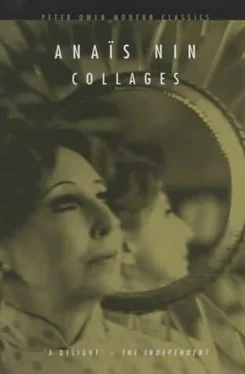The walls were covered with photographs of the four women she had written about, who resembled her so much that her face could have been substituted for all of them.
Bruce had to appear in a television show so he left the party early, and much later Renate was placed in a taxi by the Consul, with a taxi driver he knew so that he felt she would be safely driven home.
The taxi driver wore a beret and rather long hair. “I’m a painter from Marseilles. The Consul and I made friends during the war. I drive him about. I’m his private chauffeur for special errands. We are drinking pals. I know him probably better than anyone, because we are bottle brothers. We both love wine and we both love women. I know his mistress. She’s a girl from Algiers. I sometimes drive her to the Consulate when he is alone. In fact, I know him better than you can ever imagine. Because I know him when he needs to escape from that role he plays, of diplomat, public figure, gentleman of letters, friend of prominent men. I know him when he wishes to drown the world he lives in because it doesn’t mean anything to him, and find girls he can talk roughly to, and does not need to be witty, or gallant, or kiss hands, or open car doors. With me he drinks all night; he knows I will drive him back safely and the dogs won’t bark, and I know how to get him to his room noiselessly. At one time we had the same mistress. She was a lovely girl who asked so little. I was then working with the American army. The girl needed a winter coat. All I could give her was an old army blanket. She dyed it, cut a pattern from her old coat, and made herself a beautiful winter coat. And then she went off to Paris to spend a few days’ leave with the Consul, in my army blanket. When her sister got married, I bought them a silk parachute (at that time they were made of silk, not nylon). The whole family sat down and out of the parachute they made a beautiful wedding dress, underwear, panties and petticoats for the whole family, and finally a nightgown for the bride. How I love to think of all those lovely girls wrapped up in parachute silk. I had a dream that they all floated through the sky, and came down to visit me in my lonely army cot.”
When he had delivered Renate to her home, he gave her his card: “You can always call on Emile, the painter from Marseilles, if you have any secret missions, secret love missions to accomplish. I am discretion itself.”
One day the Consul’s wife asked Renate and Bruce to take her to the American desert which she had never seen. They agreed to drive her there. The Consul’s wife packed a wicker basket with a picnic lunch. The wicker clasp was broken so she slipped a pencil through the noose. For the desert she wore sandals as worn as the Turkish rugs and loose fitting clothes which seemed like pale echoes of former Oriental wear.
Was it the American desert she had come to see or was she in her mind, superimposing over it the deserts of China, Africa, India, and this one a background upon which to weave reconstructions of ast scenes, drum heats by an open fire, horse’s hoofs and Arab shouts, while lambs roasted on a spit at night, black tents and midnight blue robes, black eyes and shining beards?
She was appreciative of the American desert but Renate did not know if she was using it like her worn rugs as a framework upon which to reweave more luxuriant scenes and wilder musical accompaniments.
Bruce was singing Western songs for her, accompanied by his guitar. The pure voice of a young man who had never known the raucous tones ofpassion, the wild cries of battle, fever, pain, despair, lust. She lost herself in the songs which matched his flawless beauty. Was he evoking for her other songs, other guitars, other young men?
With those who had lived such full lives it was difficult to know which one they were evoking at the moment, and how much of past colors they were using to paint the present with. Did she seesignboards, motels, coffee shops, giant hot dog signs, or mirages, ochre sand dunes, and vermilion sunsets?
“How strange it is,” she said, “this beautiful desert seems uninhabited, as if the people living on it did not belong here. As if all of us were tourists!”
Then she talked about the Consul. The pattern of their marriage was frayed. The silver, gold, purple, red and green threads were worn away. What was left was her knowledge that he was possessed by his mother’s spirit who had willed him first of all to be a war hero, then to surpass Don Juan with women. He had dutifully proceeded to fulfill all her wishes. He had brought her his war scar and his medals. But before he could present her with his prize for the best novel of the year, she had died.
The Consul’s wife had played the role of substitute mother almost to perfection. She admired military prowess, she collaborated in his writing, she took pride even in his lover’s prowess. She shared his love of politics, history, languages. She was at one with his ambitions. Her English coolness saved him from tears and clinging. She thought they would remain life companions if not bed companions.
Every scene between them was a witty charade. She always held the door open and he never left.
But it was only in Los Angeles that he began to talk about adopting a daughter. All these years while they traveled and he wrote his books, he had not thought about children. But now he felt he needed a daughter.
The Consul’s wife had smiled and said: “That should be simple nowadays. There are so many orphans in the world, in Korea, in Hungary, in Poland.”
But the Consul protested: “Oh, no, oh, no. I don’t want an undernourished, a deficient, pathetic, anaemic war victim in the house. I want a tanned, healthy, American child.”
The Consul’s wife was telling Renate and Bruce this story. “He means Lolita,” said Renate.
The Consul’s wife remembered that in Turkey in moments of crisis, she had smoked opium. The poet Michaux had described how it was hashish which gave the illusion of levitation, and that it was from taking the drug that the legend of the “flying carpets” had originated. It was a flying carpet she needed now. But she knew of no opium den in Los Angeles, so friends gave her a tranquilizer.
She lay on her canopied bed and waited for its effects, waited to be wafted away from the Consulate.
“The opposite happened. I felt myself growing heavier and more passive. I felt myself turning into a white slug.”
In spite of the tranquilizers, the Consul’s wife realized that the adoption of an American daughter, a healthy American orphan, had subtly developed into an expedition into the realm of nubile youth from which he might never return, for it was he who had been adopted by a young film star. She began to wonder if their story were finished.
She remembered a day in Morocco, when she sat in a cafe and while waiting for the Consul to end a conference, had been embroidering a petit point tapestry. The Moroccans had gathered around her to watch her as they watched other craftsmen working the streets. She was using all the colored wools they loved, and her needlework was nimble. She worked on a small square and was but halfway done. One of the Moroccans in long black robes, with a dignified bearing, bent over her and whispered: “Would the lady give me this embroidery in memory of her fair hands at work? I have never seen such fair hands at work.”
The Consul’s wife had been startled by the request. She had never parted with her embroideries. They covered all the chairs at the Consulate for many years. And all she could think to say was: “But it is not finished.”
The Moroccan did not ponder this very much or very long. He almost immediately answered: “But dear lady, according to the Koran, nothing is ever finished.”
Nothing is ever finished.
Читать дальше












